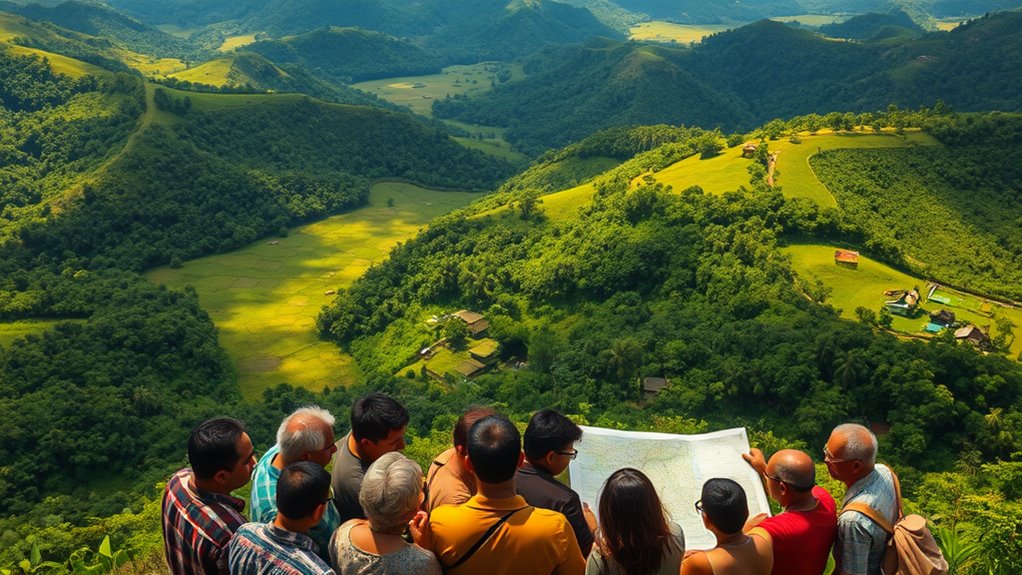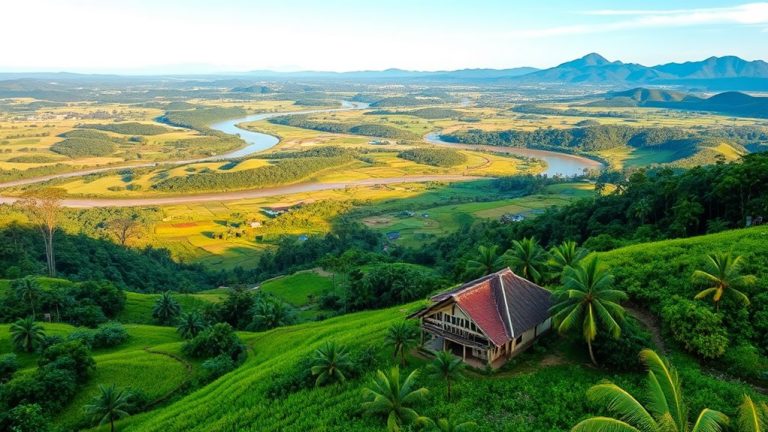You might not realize that land ownership in Sabah and Sarawak is governed by distinct regulations that set them apart from the rest of Malaysia. Steering through these complexities can be particularly challenging, especially for non-Sabahans who face specific restrictions and must secure Ministerial approval for land transactions. It's not just about understanding the legal framework; engaging with local communities and respecting indigenous rights is vital. As you consider property acquisition in these regions, you'll want to grasp the critical steps involved to avoid potential pitfalls.
Land Ownership Framework in Sabah
Understanding the land ownership framework in Sabah is vital for anyone looking to traverse its complex regulations. You might be surprised to learn that the Sabah Land Ordinance 1930 governs all land dealings here, laying out the rules for acquiring and occupying State Lands. It's not just about buying land; it's about understanding what you can and can't do with it.
For instance, if you're a non-Sabahans, you need to tread carefully. You're generally barred from acquiring native land or any land listed under the Field Register without special permission from the Minister. This might feel frustrating, especially if you've found a piece of paradise you want to call home.
And while foreign nationals can buy residential properties valued at RM500,000 or above, keep in mind that these rules were only amended recently, in 2022. Additionally, foreign ownership regulations can significantly impact your investment decisions and strategies in the region.
The emphasis on protecting indigenous rights can make the process feel intimidating, but it's vital for ensuring fairness. If you're considering a land deal, keep in mind that any transactions between natives and non-natives require ministerial approval.
It's a maze, but knowing these guidelines can help you avoid costly pitfalls while traversing this intricate landscape.
Types and Classes of Land
When exploring land ownership in Sabah and Sarawak, it's vital to recognize that land is classified into different categories, each carrying its own set of rights and restrictions. This can be quite overwhelming, especially when you consider the unique rules that apply to non-natives. Understanding these classifications can help guarantee you're making informed decisions.
Here's a quick overview of the main types of land in these regions:
| Type of Land | Description |
|---|---|
| State Lands | Government-owned land with specific regulations. |
| Reserved Lands | Land set aside for specific purposes or protection. |
| Alienated Lands | Land granted to individuals or entities for use. |
In Sabah, you'll encounter Native Title, Field Register, Country Lease, and Provisional Lease, all with distinct guidelines. Meanwhile, Sarawak has Mixed Zone, Native Area, and Native Customary Land, among others. It's frustrating to see how Native Sarawakians enjoy broader rights compared to non-natives, but knowing these classifications can empower you in traversing this complex landscape. Just remember, it's vital to seek permission before making any decisions. Additionally, the government support initiatives in place to improve housing can also influence land ownership dynamics in these regions.
Foreign Ownership Guidelines

Steering through foreign ownership in Sabah can be tricky, especially with regulations that impact your ability to purchase property. If you're a foreign national looking to buy a residential property, you'll need to guarantee it's valued at RM500,000 or more.
But don't get too excited just yet—your purchase must get the green light from the Sabah Land and Survey Department. The guidelines, laid out in the Pekeliling Mengenai Garis Panduan, can seem overwhelming, with specific conditions and compliance requirements.
It gets even more complicated if you're eyeing native land or land on the Field Register. You can't just buy it; you'll need written permission from the Minister.
It's disappointing to realize that while you may have the funds, there are still barriers to your dreams. The amendments made in 2022 do clarify some parts of the process, but maneuvering these waters still feels intimidating.
Additionally, compliance with the National Land Code 1965 is essential for property acquisition, adding another layer of complexity to the buying process.
You'll need to stay informed and comply with local laws to respect Sabah's indigenous rights. It's all about understanding the rules to avoid costly mistakes—something every prospective buyer should take seriously.
Cultural and Environmental Considerations
Cultural and environmental considerations play a vital role in land ownership in Sabah, and it's significant for potential buyers to grasp their importance. You can't just think about the land; you need to understand the people and environment tied to it. Engaging with local communities is fundamental.
For instance, many indigenous groups have deep-rooted customs that shape how land is used. Ignoring these can lead to disputes and hurt relationships.
Moreover, if you're planning any developments, bear in mind that environmental impact assessments are a must. These assessments guarantee that your projects don't harm the rich biodiversity that Sabah is known for. It's not just about building; it's about preserving what makes this place unique.
The Sabah Land Ordinance stands firm on respecting cultural interests, so compliance with local customs isn't optional—it's imperative. Without acknowledging these factors, you risk not only losing your investment but also negatively impacting the community.
The rise of indigenous land ownership, from 24.5% in 2010 to 42.7% in 2021, shows how significant it's to respect and integrate local values in any property dealings. You have a responsibility to guarantee that your actions benefit everyone involved. Additionally, understanding the importance of affordable housing developments can further support community integration and sustainability in the region.
Steps for Property Acquisition

Maneuvering the property acquisition process in Sabah and Sarawak requires a solid understanding of local land laws and regulations.
Initially, you need to familiarize yourself with the Sabah Land Ordinance 1930 and the Sarawak Land Code 1958. These laws lay out the rules for land ownership and acquisition, which can feel like a maze. If you're a foreign buyer, make sure your desired property is valued at RM500,000 or more, as you'll need to submit a formal application to the Land and Survey Departments for approval.
Don't forget, non-Sabahans can't acquire Native Land without permission from the Minister, and you may have to navigate the complexities of dealing with Native Title holders, which can feel overwhelming.
The application process usually requires you to submit relevant documents and undergo assessment, which might feel like a slow crawl. Engaging with local communities can be a game-changer. They can provide valuable insights that help you understand land use implications and navigate this complicated process.
It is also crucial to conduct thorough due diligence to check for any legal or financial issues associated with the property before finalizing your purchase.
It's tough, but taking these steps will help you stay compliant and protect your investment in this beautiful region.
Frequently Asked Questions
How Do You Understand the System of Land Ownership in Malaysia?
You'll find Malaysia's land ownership system complex, with state-specific laws governing diverse categories. It's essential to understand these regulations and guarantee compliance, especially if you're considering property acquisition or investment to protect your interests.
Can Sarawakians Buy Land in Sabah?
Yes, Sarawakians can buy land in Sabah, but you'll need to follow specific regulations. Make sure to submit your application to the Sabah Land and Survey Department and understand the local laws for safer transactions.
How to Conduct Land Search in Sabah?
Start your search smoothly by visiting the Sabah Land and Survey Department. Firmly sift through land records, verify ownership, and check classifications. Engaging locals can also improve your understanding and guarantee safer transactions.
What Are the Different Types of Land Titles in Sabah?
In Sabah, you'll encounter Freehold, Leasehold, Qualified Title, and Final Title. Each type affects your ownership rights differently, so it's vital to understand them to guarantee your investment's security and future planning.
Conclusion
Steering land ownership in Sabah and Sarawak can feel overwhelming, especially with all the rules and regulations. You might think it's too complicated to even try, but understanding the local laws is crucial. Take it from someone who's been through the process—getting to know the community and respecting their customs isn't just the right thing to do; it can actually make your expedition smoother. Don't let the challenges discourage you; the rewards of successful land ownership are worth the effort.
